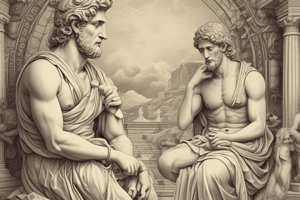Podcast
Questions and Answers
What does 'philosophia' mean?
What does 'philosophia' mean?
love of wisdom
Which Greek philosopher is known for the quote 'An unexamined life is not worth living'?
Which Greek philosopher is known for the quote 'An unexamined life is not worth living'?
- Socrates (correct)
- Aristotle
- Plato
- Confucius
What was the method employed by Socrates to engage with people?
What was the method employed by Socrates to engage with people?
dialogue
Which of these allegories is associated with Plato?
Which of these allegories is associated with Plato?
What approach did Aristotle believe could be achieved through the senses?
What approach did Aristotle believe could be achieved through the senses?
Eastern philosophy is often interchangeable with religion.
Eastern philosophy is often interchangeable with religion.
Who is the founder of Confucianism?
Who is the founder of Confucianism?
Which two virtues are notable in Confucianism?
Which two virtues are notable in Confucianism?
What does Buddhism focus on concerning human experience?
What does Buddhism focus on concerning human experience?
What is the main difference between opinion and truth?
What is the main difference between opinion and truth?
What is the Socratic Method primarily focused on?
What is the Socratic Method primarily focused on?
The dialectical method emphasizes studying and understanding the real development and change, often used by philosophers like _____ and _____ .
The dialectical method emphasizes studying and understanding the real development and change, often used by philosophers like _____ and _____ .
What is the essence of the phenomenological method according to Edmund Husserl?
What is the essence of the phenomenological method according to Edmund Husserl?
Flashcards are hidden until you start studying
Study Notes
Philosophy Overview
- Philosophy or "philosophia" means “love of wisdom,” emphasizing the importance of action alongside knowledge.
- Two major philosophical traditions exist: Western and Eastern.
- Western philosophy is analytical and rigorous.
- Eastern philosophy blends with religion and emphasizes philosophy as a way of life.
Western Philosophy
-
Key figures include Socrates, Plato, and Aristotle, who explored human rational capacities.
-
Socrates
- Born circa 470 B.C. in Athens; focused on intellectual activity over appearance.
- Engaged in dialogues, primarily discussing justice, virtue, morality, and the meaning of life.
- Famous quote: “An unexamined life is not worth living.”
- Charged with corrupting youth, leading to his death.
-
Plato
- Student of Socrates, born around 428 B.C., died 347 B.C.
- Transcribed Socratic dialogues and authored "The Republic."
- The "Allegory of the Cave" illustrates the distinction between the real world and perceptions.
- Argued for seeking truth through recollection of known forms via interacting with actual objects.
-
Aristotle
- Born circa 384 B.C., studied under Plato, established the Lyceum.
- Opposed Plato’s Theory of Forms, advocating that forms are perceived through senses.
- Divided forms into substance and accidents; substance is essential, accidents result from usage.
- Advocated for the application of reason and sensory experience to understand existence.
Eastern Philosophy
- Centers around self-exploration, asking, “Who and what am I?”
- Links closely to religious practices and beliefs, emphasizing lived experience.
Confucianism
- Founded by Confucius (Kongzi) over 2500 years ago in ancient China.
- Promotes peace through personal example and virtue, asserting good rulers inspire good behavior.
- Stresses the importance of family as foundational to social harmony.
- Two key virtues:
- Jen (human-heartedness) emphasizes compassion.
- Yi (righteousness) stresses moral action.
Buddhism
- Focuses on the nature of suffering and the human struggle for lasting happiness.
- Teaches the importance of overcoming attachment to transient pleasures.
Indian Philosophy
- Prioritizes inner self-awareness and moral living over the physical world.
Opinion vs. Truth
- Opinion is personal, lacks definitive evidence and can change over time.
- Truth is universal, enduring, and verified through facts; it transcends personal belief.
- Correspondence Theory suggests truth arises from alignment between perception and reality.
Methods of Philosophizing
- Socratic Method: Encourages self-examination through open-ended questioning to uncover truth.
- Dialectical Method: A modern evolution rooted in ancient debates; focuses on understanding progress and change.
- Phenomenological Method: Investigates the essence of experiences and consciousness; foundational to modern understanding of human perception.
Studying That Suits You
Use AI to generate personalized quizzes and flashcards to suit your learning preferences.





